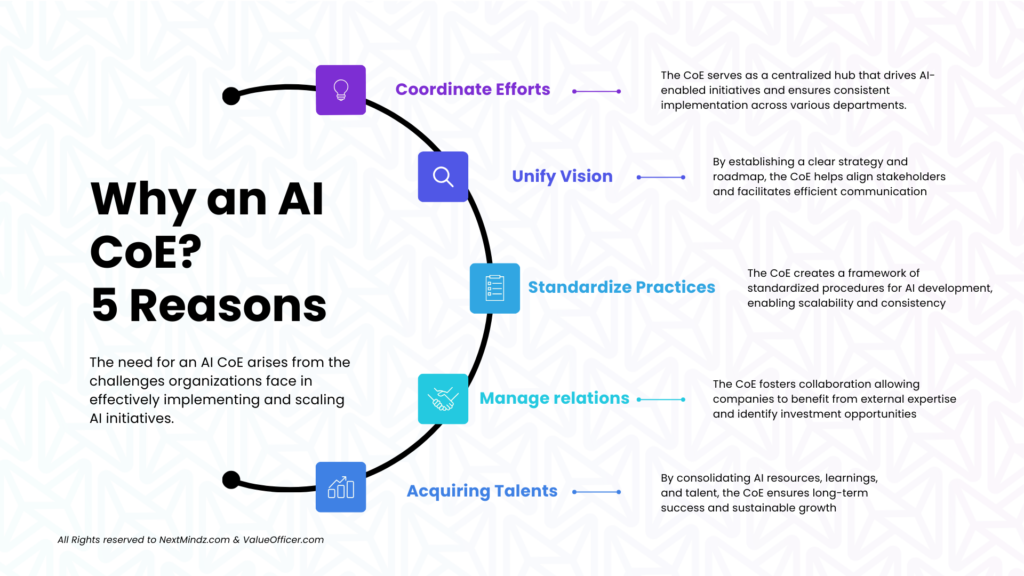Artificial Intelligence (AI) has emerged as a transformative force, revolutionizing industries and driving innovation across various sectors. As organizations seek to harness the power of AI to gain a competitive edge, establishing an AI Center of Excellence (CoE) has become increasingly crucial. An AI CoE serves as a strategic hub that centralizes AI efforts, providing leadership, expertise, and a structured approach to the adoption and integration of AI technologies.
- The Concept of Centers of Excellence
- Why an AI CoE?
- The Six Components of an AI CoE
- Success Stories and Impact
- Statistics on AI CoEs
- The Way Forward
The Concept of Centers of Excellence
A Center of Excellence is a team, a shared facility, or an entity that provides leadership, best practices, research, support, and training for a focus area. In the context of AI, a CoE centralizes AI-related functions to ensure that the organization leverages AI technologies effectively and efficiently. The AI CoE serves as a hub for AI initiatives, aligning them with the organization’s strategic goals and providing the necessary infrastructure and expertise.
Why an AI CoE?
The need for an AI CoE arises from the challenges organizations face in effectively implementing and scaling AI initiatives. These challenges include limited AI expertise, increasing data complexity, and the lack of standardized tools and processes for AI development. An AI CoE addresses these challenges by:
- Coordinating AI efforts across the organization: The CoE serves as a centralized hub that drives AI-enabled initiatives and ensures consistent implementation across various departments.
- Creating a unified vision for AI: By establishing a clear strategy and roadmap, the CoE helps align stakeholders and facilitates efficient communication.
- Developing standardized practices and processes: The CoE creates a framework of standardized procedures for AI development, enabling scalability and consistency.
- Managing relationships with external partners: The CoE fosters collaboration with startups, universities, and other organizations, allowing companies to benefit from external expertise and identify investment opportunities.
- Acquiring and developing internal AI talent: By consolidating AI resources, learnings, and talent, the CoE ensures long-term success and sustainable growth.

The Six Components of an AI CoE
An effective AI CoE is built upon six key components, each playing a crucial role in creating a comprehensive framework for successful AI implementation:
- Training & Acculturation: Focuses on educating employees about AI technologies, their potential applications, and best practices, fostering a culture of continuous learning and innovation.
- Strategy & Governance: Establishes clear objectives, key results (OKRs), and an operating model that aligns with the organization’s strategic vision, ensuring accountability, compliance, and effective decision-making.
- AI Exploration: Involves conducting thorough assessments to uncover potential use cases that align with business objectives, engaging stakeholders, analyzing data, and evaluating existing processes to determine where AI can add value.
- Data Management: Prioritizes data quality, integrity, and compliance with privacy regulations, establishing robust data governance frameworks encompassing data acquisition, storage, processing, and security.
- Infrastructure & Security: Assesses current systems and identifies necessary upgrades to support AI applications, ensuring that infrastructure can handle the computational demands of AI models and that security measures are in place to protect sensitive data.
- Change Management: Develop strategies to manage the cultural and operational shifts that accompany AI integration, engaging stakeholders, addressing resistance to change, and promoting a mindset of innovation.
Success Stories and Impact
Setting an AI CoEs has yielded significant results for organizations across various industries. Meta, for example, centralized AI talent, resources, and infrastructure under a data organizational umbrella, enabling the company to become an AI-first business and deploy model-supported products throughout the enterprise. Another success story is Airbus, which partnered with V Squared to build a data and analytics organization, delivering products with $100M+ in ARR and establishing a small to large data team. These examples demonstrate the transformative impact of AI CoEs in driving innovation, improving operational efficiency, and unlocking new revenue streams.
Statistics on AI CoEs
Recent studies highlight the growing adoption and impact of AI CoEs:
- Adoption Rates: According to a 2023 report by Gartner, over 70% of Fortune 500 companies have established or are planning to establish an AI CoE.
- ROI: A study by McKinsey found that organizations with an AI CoE achieve up to 30% higher ROI on their AI investments compared to those without a CoE.
- Efficiency Gains: Companies with an AI CoE report a 25% reduction in time-to-market for AI solutions, as per a 2022 Deloitte survey.
The Way Forward
As organizations continue to recognize the strategic importance of AI, the establishment of AI CoEs will become increasingly prevalent. According to Gartner, 50% of organizations with over three AI initiatives underway will create an AI CoE by 2022. Additionally, 37% of large firms in the U.S. that use AI have already established a CoE.In conclusion, an AI Center of Excellence provides a comprehensive framework for organizations to harness the power of AI and drive sustainable growth. By focusing on training, governance, opportunity identification, data management, infrastructure, and change management, AI CoEs enable organizations to overcome challenges, foster innovation, and stay ahead in an increasingly competitive landscape.





